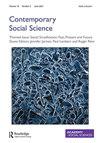南非德班和东开普省COVID-19自我检测:针对决策者的定性调查
IF 3.9
Q1 SOCIAL SCIENCES, INTERDISCIPLINARY
引用次数: 5
摘要
摘要创新的诊断解决方案对于改善新冠肺炎病例检测和减缓其在资源紧张环境中的传播至关重要。为了了解南非社区如何利用快速的严重急性呼吸系统综合征冠状病毒2型抗原自检并对自检结果做出反应,我们对医护人员、民间社会团体代表和潜在的自检实施者进行了一项定性研究,包括半结构化访谈和焦点小组讨论。使用对性别和地点敏感的主题分析方法来评估在南非开展自我测试的52名决策者如何看待这种创新诊断方法的价值和效用。知情者表示,南非人可能会重视一种设备,这种设备可以让他们在自己方便的情况下私下自我测试,同时避免社会耻辱的风险,并不得不在设施中等待新冠肺炎检测结果。他们还强调,需要开展提高认识和宣传活动,并确保自测前/自测后的咨询服务易于获得。与传统领导人和社区组织的合作将改善结果沟通以及与咨询和确认测试的联系。SARS-CoV-2自我检测被认为是已经对使用艾滋病毒自我检测敏感的人群可以接受的,这是一种分散的解决方案,有助于降低新冠肺炎的发病率,防止社会经济指标进一步恶化。本文章由计算机程序翻译,如有差异,请以英文原文为准。
Self-testing for COVID-19 in Durban and Eastern Cape, South Africa: a qualitative inquiry targeting decision-takers
ABSTRACT Innovative diagnostic solutions are essential to improve COVID-19 case detection and slow its spread in resource-constrained settings. To understand how South African communities may utilise rapid SARS-CoV-2 antigen self-testing and react to self-test results, we conducted a qualitative study, involving semi-structured interviews and focus group discussions, of healthcare workers, representatives of civil society groups, and potential self-testing implementors. A sex- and location-sensitive thematic analysis approach was used to assess how 52 decision-takers on self-testing roll-out in South Africa perceive the value and utility of this innovative diagnostic approach. Informants suggested South Africans might value a device that allows them to self-test in private, at their own convenience, while avoiding the risk of social stigma and having to wait for COVID-19 test results in a facility. They also emphasised the need for awareness and sensitisation campaigns and to ensure pre-/post-self-test counselling services are easily accessible. Collaboration with traditional leaders and community-based organisations would improve results communication and linkage to counselling and confirmatory testing. SARS-CoV-2 self-testing was perceived to be acceptable to a population already sensitised to the use of HIV self-testing, being a decentralised solution that would help reduce the incidence of COVID-19 and prevent any further deterioration of socio-economic indicators.
求助全文
通过发布文献求助,成功后即可免费获取论文全文。
去求助
来源期刊

Contemporary Social Science
SOCIAL SCIENCES, INTERDISCIPLINARY-
CiteScore
6.40
自引率
8.30%
发文量
15
 求助内容:
求助内容: 应助结果提醒方式:
应助结果提醒方式:


